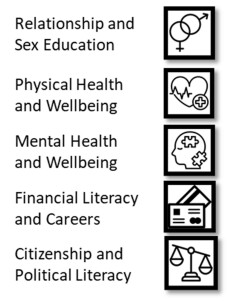PSHCE
For detailed Curriculum information on PSHCE at Toynbee, please visit: PSHCE Curriculum
PSHCE (Personal, Social, Health and Citizenship Education)
Head of PSHCE
Miss R Murchie r.murchie@toynbee.hants.sch.uk
The vision of Personal Development at Toynbee is that we believe that it is our core role to unlock the potential in every child by developing the Whole Child.
Personal development is both a subject (PSHCE) and a school ethos. It is reflected in our school motto and core value of ensuring every pupil achieves their “Personal Best”. We want all our pupils to leave Toynbee feeling confident and ready to achieve success in the wider world.
Our aim through the PSHCE curriculum is to teach pupils how to succeed in life safely, happily and healthily. Young people are growing up in a world that is constantly changing, and it is our duty to teach our pupils transferable life skills. We aim to be responsive to addressing current topical issues and changes in society and we aim for our pupils to be able to contribute positively to the world around them.
PSHCE is the curriculum subject that deals with real-life issues affecting our children, families and communities. It’s concerned with the social, health and economic realities of their lives, experiences and attitudes including relationships. It supports pupils to be healthy (mentally and physically), safe (online and offline) and equipped to thrive in their relationships and careers.
Why is PSHCE Important?
- Contributes to physical and mental health and wellbeing, encouraging individual responsibility for health
- Contributes to the safety and protection of our children and young people, from staying safe online to understanding risks associated with drugs and alcohol and knowing the law surrounding these topics
- Contributes to the information young people need to help them develop healthy, nurturing relationships of all kinds, not just intimate relationships, and know boundaries within the law
- Promotes independence, resilience and responsibility — preparing children and young people for future roles as parents, employees and leaders
- Supports employability by developing the personal and social skills demanded by commerce and industry
- Supports pupils to be critical consumers of information and develops the skills to identify misleading news or views on social media and elsewhere
Parents’ and carers’ support is important to the success of our PSHCE programme. Pupils are encouraged to talk about the curriculum with parents and carers.
At Key Stage 3 and 4 discrete PSHCE lessons are taught by a specialised team of teachers. Other subject areas contribute to certain topics such as biology in Science and aspects of relationship and health education arise in RS, English, Drama, PE and Food Technology.
PSHCE Curriculum
PSHCE is taught as a themed curriculum. PSHCE lessons cover a wide range of topics and curriculum areas based on the five core themes which are built upon across the Key Stages.
The five themes are:

Physical and Mental Health Education aims to give your child the information they need to make good decisions about their own health and wellbeing, to recognise issues in themselves and others, and to seek support as early as possible when issues arise.
Topics include:
- Mental Wellbeing
- Internet safety and harms
- Physical health and fitness
- Healthy Eating
- Drugs, alcohol and tobacco
- Health and prevention
- Basic first aid
- Changing adolescent body
Relationships and Sex Education (RSE) aims to give young people the information they need to help them develop healthy, nurturing relationships of all kinds. They will explore what healthy and unhealthy relationships look like and what makes a good friend, colleague and successful marriage or committed relationship.
At the appropriate time, the focus will move to developing intimate relationships, to equip your child with the knowledge they need to make safe, informed and healthy choices as they progress through adult life.
Topics include:
- Secondary transition
- Friendship, including respectful relationships
- Families
- Online Media
- Anti-bullying
- Being safe
- Consent
- Intimate and sexual relationships, including sexual health
Financial Literacy and Careers AND Citizenship and Political Literacy aims to teach our young people how to be responsible citizens and possess the skills needed for the future. Pupils will learn about careers and other work-related learning aspects including citizenship and financial management.
